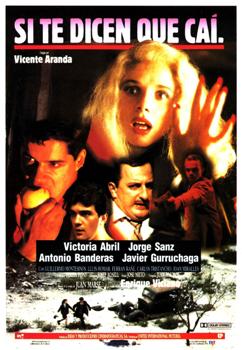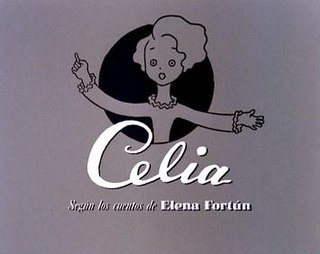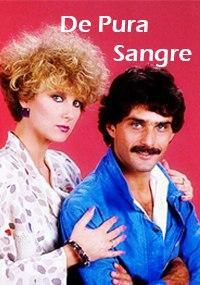
El fulgor y la sangre (Brilliance and blood is the meaning in English) is the first novel written by Spanish writer Ignacio Aldecoa, first published in 1954.

El fulgor y la sangre (Brilliance and blood is the meaning in English) is the first novel written by Spanish writer Ignacio Aldecoa, first published in 1954.
In the closed and ruinous environment of a barracks lost in a Spanish mountain range, the wives of some civil guards receive news that one of them has died. Without knowing about whom the news is, they await distressedly for the confirmation of the deceased's identity.
This is narrated from the point of view of Pedro. The telephone rings and we learn that someone has died. Ruipérez says not to tell the women about what has just happened.
This chapter focuses on what has happened to Sonsoles. Firstly that her father was murdered by the other villagers, but it is not stated whether this murder was carried out due to political or personal reasons. Because the village is not named, was it in a nationalist or republican zone within Spain? Sonsoles also became a nun, but left in order to care for her ill grandmother.
In this chapter Felisa's life is discussed. Her father and brother were left wingers and she rebels against them by marrying Ruipérez.
María is advised by her father to obtain a career, so she becomes a teacher, which is a revered position, alongside being mayor or the local priest. She has thus gained status although loses this when the Republic comes into power. She married Baldomero but doesn't love him.
The madrileña Carmen's life is flashbacked in this sequence. We learn that she was an apprentice in a hair salon in Madrid under a woman called Asunción, an anarchist.
Here we learn about what has happened in Ernesta's life. We see previously that she is younger than the other women and had worked as a maid for a wealthy family. The son of the wealthy family comes back from the war a cripple and his girlfriend leaves him and he becomes embittered as a result.
Felisa and Ruipérez.
María and Baldomero.
Ernesta and Guillermo.
Francisco - who has lunch and dines at Ernesta and Guillermo's house.
Pedro and Sonsoles. They have a son, also called Pedro.
Carmen and Cecilio Jiménez, who are from Madrid. Their son is described by Pedro as 'pale and thin'.
The narrative style within El fulgor y la sangre is told from the third person.
The story is set in an army barracks in an unknown setting in Castille in Spain. The army barracks in the novel itself is described as a 'castle'. The block itself is divided into six sections, five for the civil guards and their families and the other for the corporal who is single.
Structurally the novel flicks between the past and present via a series of flashbacks in each chapter.

Muchachitas is a Mexican telenovela produced by Emilio Larrosa for Televisa in 1991. The telenovela was also shown on Univisión in the early 1990s.
Destinos: An Introduction to Spanish, also known as simply Destinos, is a television program created by Bill VanPatten, who at the time was Professor of Spanish and Second Language Acquisition at the University of Illinois at Urbana Champaign. Running for two seasons, the show began in 1992 and was designed to introduce viewers to the basics of the Spanish language. Its 52 episodes are often used for educational purposes in schools, and are available online from the Annenberg Learner site and some local PBS stations. According to the Annenberg site, Destinos is one of the most popular series on the site to stream, and has sold more than any other Annenberg Media learning series or course.

José Ignacio Aldecoa e Isasi was a Spanish writer. He was the nephew of the painter Adrián Aldecoa.

Pedro Páramo is a novel by Mexican writer Juan Rulfo, first published in 1955. The novel tells the story of Juan Preciado, a man who promises his mother on her deathbed to meet Preciado's father for the first time in the town of Comala only to come across a literal ghost town, that is, populated by spectral characters. During the course of the novel, these ghostly inhabitants reveal details about life and afterlife in Comala, including that of Preciado's reckless father, Pedro Páramo, and his centrality for the town. Initially, the novel was met with cold critical reception and sold only two thousand copies during the first four years; later, however, the book became highly acclaimed. Páramo was a key influence on Latin American writers such as Gabriel García Márquez. Pedro Páramo has been translated into more than 30 different languages and the English version has sold more than a million copies in the United States.

Volver is a 2006 Spanish comedy-drama film written and directed by Pedro Almodóvar. The film features an ensemble cast that includes Penélope Cruz, Carmen Maura, Lola Dueñas, Blanca Portillo, Yohana Cobo, and Chus Lampreave. Revolving around an eccentric family of women from a wind-swept region south of Madrid, Cruz stars as Raimunda, a working-class woman forced to go to great lengths to protect her 14-year-old daughter Paula. To top off the family crisis, her mother Irene returns from the dead to tie up loose ends.

Elena Quiroga de Abarca was a Spanish writer.

The Tower of the Seven Hunchbacks is a 1944 Spanish mystery film directed by Edgar Neville. It is based on a novel of the same title by Emilio Carrere.

Blood and Sand is a 1989 Spanish drama film directed by Javier Elorrieta and starring Christopher Rydell, Sharon Stone, and Ana Torrent. It was loosely based on the novel Sangre y arena of Vicente Blasco Ibáñez, which had been adapted for the screen three times before, in 1916, 1922 and 1941.
Un Paso Adelante is a Spanish TV drama similar to the American 1980s TV series Fame. It was originally broadcast on Spanish channel Antena 3 from 2002 to 2005. It has also been a huge success in Spanish-speaking countries, in Germany, Italy, Serbia, Montenegro and in France. It began airing on Séries+ in Canada in 2011. Choreographers: Luka Yexi Anna & Carlos Infante Myriam Benedited

Fortunata y Jacinta, was written by Benito Pérez Galdós in 1887 and published in the same year. It is, together with Leopoldo Alas y Ureña's La Regenta, one of the most popular and representative novels of Spanish literary realism. Born in Las Palmas de Gran Canaria, Canary Islands, the author went to Madrid, the capital, to study law at age 18. There he would create a literary world that was present in almost all his writings. The novel was a sensation upon its release because of its scathing critique of the Spanish middle class, and for its frank sexuality. While criticized by political and religious leaders, it was praised by peers of Galdós for its realistic depiction of life amongst all classes in 19th century Madrid.

If They Tell You I Fell is a 1989 Spanish film written and directed by Vicente Aranda, starring Victoria Abril and Jorge Sanz along with Antonio Banderas and Javier Gurruchaga. It is an adaptation of the novel of the same title by Juan Marsé, which was based on the killing of Carmen Broto. Set mostly in the old quarter of 1940s Barcelona, the film centers in a young rag and bone merchant who falls in love with a prostitute. If They Tell You I Fell has an intricate narrative in which real and imagined stories blend in a crosswords style.

Celia is a Spanish children's television series created by José Luis Borau in 1992 for the national Spanish public-service channel Televisión Española. It is based on the classic Spanish children's novels of the same name by Elena Fortún, primarily Celia, lo que dice (1929) and Celia en el colegio (1932). The books and television series tell the stories of a wild seven-year-old girl named Celia Gálvez de Moltanbán. In addition to focusing on Celia, the show touched lightly on Spanish life in the 1930s, such as the upcoming civil war, a changing nation, and the social issues and ideas at the time.
Alondra is a Mexican telenovela produced by Carla Estrada for Televisa in 1995. The story based on Casandra created by Yolanda Vargas Dulché. For personal reasons Yolanda Vargas Dulché changed the name of Casandra to Alondra in honor of her granddaughter Alondra de la Parra. It stars Ana Colchero, Ernesto Laguardia and Gonzalo Vega.

The Consul of Sodom is a 2009 Spanish film directed by Sigfrid Monleón and starring Jordi Mollà. It is a biopic of the Catalan poet Jaime Gil de Biedma, based on a biography written by Miguel Dalmau.

El Crack is a 1981 Spanish film drama co-written and directed by José Luis Garci, starring Alfredo Landa. The plot was inspired by the novels written by Dashiell Hammett, to whom the film is dedicated. It is a detective film and basically a Spanish film noir. The story takes place in Madrid and New York City in December 1980.

The Weakness of the Bolshevik is a 2003 Spanish psychological drama film directed by Manuel Martín Cuenca from a screenplay he co-wrote with Lorenzo Silva, based on Silva's novel La flaqueza del bolchevique.

De pura sangre is a Mexican telenovela produced by Ernesto Alonso for Televisa in 1985. Its original story of María Zarattini and directed by José Rendón.

María Carmen de Icaza y de León, 8th Baroness of Claret was a Spanish journalist and novelist from 1935–60. She enjoyed success with her 1936 novel, Cristina Guzmán, which was subsequently adapted for the stage, television and cinema. By 1945, she was a best-selling writer in Spain. Her father was Mexican writer and diplomat Francisco A. de Icaza.
Sangre azul is a Venezuelan telenovela developed by José Ignacio Cabrujas and Julio César Mármol and produced by Radio Caracas Television in 1979.

Carmen Castillo García is a Spanish Professor Emeritus of Classical Philology at the University of Navarra in Pamplona. She is the second woman to obtain a Latin Philology Chair in Spain. She is an expert on the Roman province of Baetica in southern Iberia.